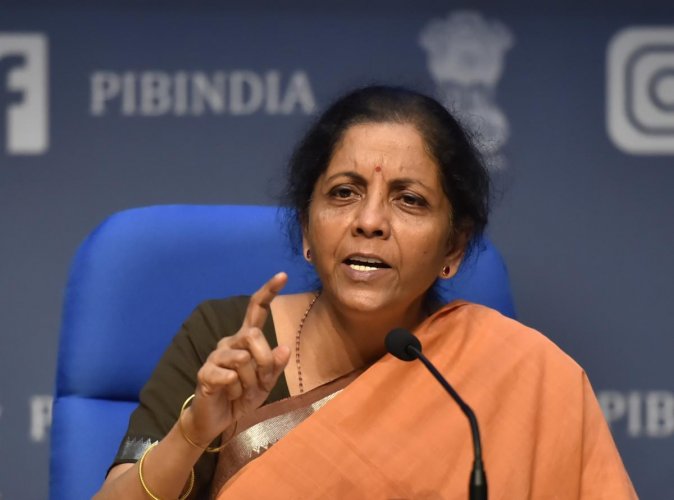New Delhi: Finance Minister Nirmala Sitharaman Sunday said reforms will be the focus of the fifth and final tranche of economic stimulus package to deal with the economic fallout of the COVID-19 pandemic.
She said the package would focus on MGNREGA, healthcare and education, businesses, de-criminalisation of the Companies Act, ease of doing business, public sector undertakings, and resources related to state government.
During the coronavirus-induced lockdown, Rs 16,394 crore has been paid to 8.19 crore farmers under the Rs 2,000 free cash dole scheme of PM Kisan, she said.
Old-age beneficiaries and others have been paid first installment of Rs 1,405 crore and a second one of Rs 1,402 crore.
She allso said that as much as Rs 10,025 crore has been transferred to 20 crore women Jan Dhan account holders. Also, 6.81 free LPG cylinders have been given to poor.
Last week, the government pledged a Rs 20 lakh crore (nearly 10 pr cent of GDP) package to support the economy headed for its first full-year contraction in more than four decades.
This included March 27 announcement of Rs 1.7 lakh crore package of free foodgrain and cash to poor for three months and the Reserve Bank of India’s Rs 5.6 lakh crore worth of liquidity measures since March.
Further to this, the government last week announced a cumulative package of Rs 10.73 lakh crore, mostly in liquidity measures with negligible extra-budget spending. The measures included a variety of steps for small businesses, street vendors, farmers and poor migrants as well as shadow banks and electricity distributors, but they have largely been either credit guarantee schemes or new fund creations to be shouldered by banks and financial institutions.
The government’s cash outgo is limited to a maximum of Rs 18,500 crore on free foodgrain and affordable housing to migrant workers as well as limited tax relief and marginal dole to some companies on employee retiral benefits.
Saturday, the government announced a hike in foreign investment limit in defence manufacturing and opened up space facilities while giving a new push to reforms of commercial coal mining, mineral block auction and privatisation of power distribution as it sought new investments to help shore up an economy hit by the coronavirus pandemic.
Beginning March 25, India imposed a three-week-long nationwide lockdown, the most far-reaching measure undertaken by any government to curb the spread of the pandemic.
The lockdown, which brought most of the economic activities to a standstill as factories and businesses were shut while rendering thousands temporarily unemployed, has since been extended twice through May 17, with some relaxations to allow resumption of economic activities.
According to estimates, the lockdown may have led to 12.2 crore people losing jobs in April and consumer demand evaporating.
(PTI)
